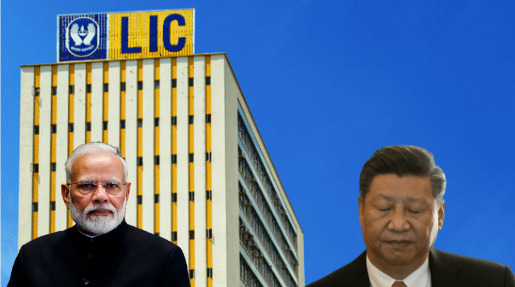The sudden crackdown by Xi Jinping on the behemoths of the Chinese economy has sent shocking waves across the world. The Chinese industrialists are looking abroad to safeguard their interests. As India offers the biggest consumer market after China, it’s no wonder that India is on top of their priority list. But, the Indian government led by Narendra Modi is well aware of these developments and, are making sure that Chinese investment in the Indian market is limited to its minimum possible value.
Chinese companies, a big no in the Indian economic space
According to a report by Reuters, India is set to block all roots of Chinese investment in the much-awaited LIC initial public offering. The conclusion of the Indian government shutting all gates for China in regards to investment in LIC IPO was drawn after their discussions with four senior government officials and a banker. Underlining the fact that Chinese investment in national assets like LIC could pose security risks, one of the government officials said- “With China, after the border clashes it cannot be business as usual. The trust deficit has significantly widened (ed),” When inquired about Chinese getting indirect entry into the IPO, they added that government would keep a check on it and attempt to form a policy which facilitates foreign investors and at the same time protect India’s security interests.

Currently, India does not allow foreign investors in the LIC, but the government is considering allowing foreign institutional investors to buy up to 20 per cent of LIC’s IPO. To block the Chinese investment in the IPO, India has three options:-
- The government can amend the current law on foreign direct investment, with a clause that would be specific to investing in LIC.
- Government has another option to make a new law which will be specially designed for rules regarding investing in LIC.
- Government can exercise to debar Chinese investors from becoming cornerstone investors (class of investors who commit in advance to invest a fixed amount of money) in Indian IPOs. This option would not stop them from buying shares in the secondary market (a platform wherein the shares of companies are traded among investors).
India answers with economic damage to China
India has long been looking to stop the inflow of foreign direct investment from Chinese investors as these investors are controlled by the Chinese Communist Party (CCP). The political connections of the Chinese investors with the CCP translate into vital information of Indian interests going directly into the Chinese government’s hands. After the clash in Galwan valley, India tightened its policy stances on China.
- India banned a total of 267 Chinese apps including Tik-Tok and AliExpress.
- In July 2020, the Indian government banned Chinese companies from participating in national highway projects.
- Companies run by the Indian government cancelled contracts with Chinese companies, ranging from solar panels and telecom equipment to railway infrastructure.
- Since power equipment was one of China’s biggest exports to India, India restricted Indian companies from buying power supply systems from China.
- Indian government blocked automatic approval for FDI from its neighbours. India used to provide automatic approval to foreign direct investment from the countries; it shares its border with. Taking advantage of the liberal policy, 99 per cent of Indian FDI had been occupied by China during the last 20 years, which posed a grievous risk to India’s strategic interests.
- India also went ahead and imposed anti-dumping duties on Chinese imports in segments like chemicals, anti-bacterial, PET, steels, and much more.
LIC is a state-owned insurance company that occupies 60 per cent of the Indian insurance market. It controls total assets of $500 billion. The strategic disinvestment by the government is expected to usher in more than $12.2 billion to the state coffers. Ten investment banks including Goldman Sachs, Citigroup, and SBI Capital Market, will handle the offering.
The Indian government is strategically disinvesting its shares from various public sector companies to improve their health and developing their efficiency.
























